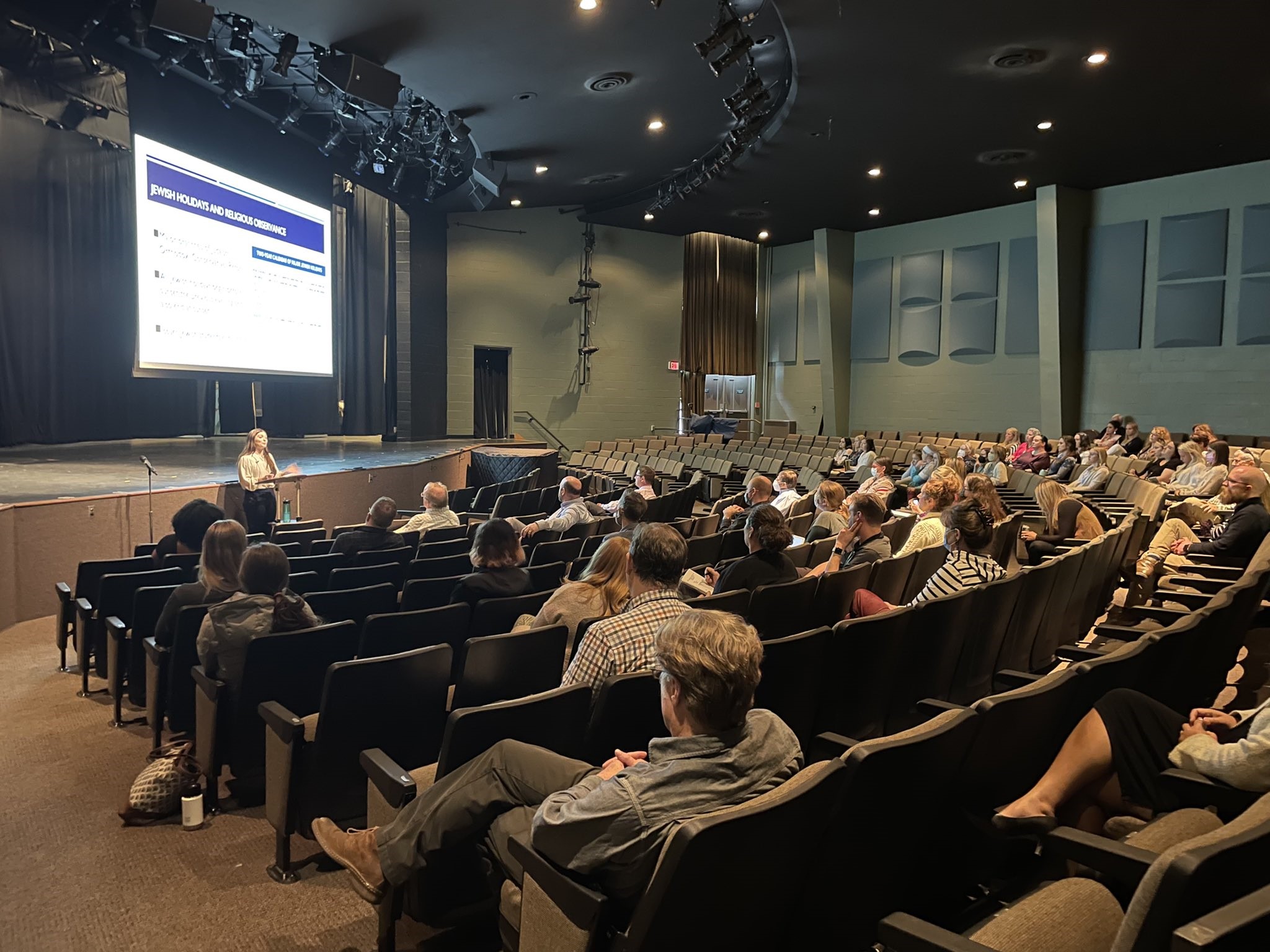The results of the Jewish Community Relations Bureau|American Jewish Committee (JCRB|AJC) 2022 Antisemitism in Schools Survey show that the fight against antisemitism toward local Jewish students is far from over.
More than 80 middle and high school students from public and private schools from around the greater Kansas City area, Lawrence and Wichita completed the survey, which included questions about their personal experiences with antisemitism at their schools.
The survey was shared on JCRB|AJC’s social media and email blasts, but JCRB|AJC also relied on community partners, congregations, youth groups, and its Leaders for Tomorrow cohorts to spread word of the survey to students.
Results of the study are disheartening. Almost 90% of students surveyed reported witnessing or experiencing at least one form of antisemitism either at school or on social media. The types of antisemitism experienced include “Jew jokes” (77% experienced), Holocaust-related comments/insults (75%), Jewish stereotypes (70%), antisemitic graffiti (63%), Holocaust denial or distortion (57%), antisemitic conspiracy theories (47%), anti-Zionism (46%) and antisemitic phrases (42%). Forty-one percent of students said they had personally been the target of antisemitism at school or on social media.
The survey showed that 35% of students said antisemitism in schools has increased over the past two years, and 41% of students said antisemitism had “stayed the same.” Only 8% said it had decreased. Ten percent of students even said that they were “rarely comfortable” expressing their Jewish identity at school.
Sarah Markowitz, JCRB|AJC Director of Education and Programs, said that the results of the 2022 survey were not unexpected.
“We were saddened by [the results], but not surprised, mostly because of all the work we’ve done with Jewish students over the past two years,” Markowitz said. “It confirmed what we already knew.”
The 2022 survey follows JCRB|AJC’s last student survey, done in 2020. Because of updated questions and methodology, the results of the two surveys are not directly comparable, but the trends in antisemitism are noticeably similar.
“I think one of the major takeaways from both surveys is just the widespread and common nature of the antisemitism these students experience,” Markowitz said. “They are experiencing everything from common jokes based off of Jewish stereotypes to swastika drawings on desks and on bathroom stalls, and ‘jokes’ relating to the Holocaust… antisemitism comes in so many various forms, and unfortunately, these Jewish students in our region are experiencing almost all the forms of antisemitism in their schools.”
JCRB|AJC offers a host of programs and education initiatives to combat local antisemitism in schools. The Prepare to Respond, Educate to Prevent (PREP) initiatives currently address much of what students in the survey said would help them feel most confident in responding to antisemitism. Markowitz said that raising awareness of the program is important.
“[PREP initiatives] focus on empowering and educating Jewish students to be effective Jewish advocates for themselves and to respond to antisemitism if and when they see it,” she said. “We also want to provide resources and education to as many students as possible, so we partner with congregations and youth groups to provide workshops.”
Another program for students is Leaders for Tomorrow (LFT), AJC's national education program for high school students that is designed to empower Jewish students to advocate on behalf of the Jewish people and Israel. This year’s cohort has 19 students — and Markowitz said that almost all of them shared that they have experienced antisemitism themselves.
“What I frequently tell the Jewish students I work with is that that is not normal,” she said. “I constantly have to remind these Jewish students that this should not be normalized; it should not be minimized.”
Media coverage from KCUR and KSHB 41 has shared the results of the survey to the greater Kansas City community. LFT alumna Marissa McLain told KSHB 41, “[The results] really just makes you feel sick, almost. I can’t believe that would happen or someone would say that. I personally am wearing a Hebrew name necklace or wearing a Jewish star and stuff like that. But there’s sometimes where [I wonder if] I should tuck it into my shirt — maybe I shouldn’t let other people see it."
JCRB|AJC also has partnerships with 15 local schools to help address how they can help stop the antisemitism their students encounter.
“We really focus on empowering Jewish students, but we also know that Jewish students need their administrators and teachers to be allies in their classrooms to stand up for Jewish students as well,” Markowitz said.
Through presentations and training, JCRB|AJC provides school administrators and teachers with ways to respond to classroom antisemitism and a better understanding of Jewish holidays and culture. JCRB|AJC also sends out a Jewish holiday calendar every year with the goal of being “as proactive as possible” and to prevent teachers scheduling tests and schools hosting major events (homecoming, prom, picture days) on holidays.
As the entire Jewish community continues to combat antisemitism, JCRB|AJC asks that those who experience or witness antisemitism fill out its confidential incident report form for students or community members. Those who have questions or requests for programs or resources can contact Markowitz at .
